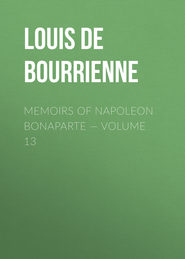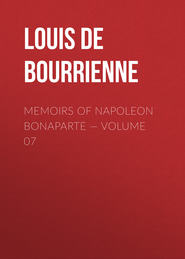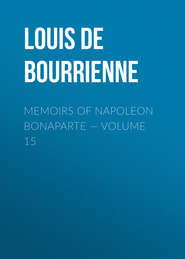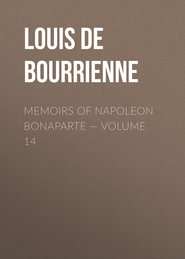По всем вопросам обращайтесь на: info@litportal.ru
(©) 2003-2024.
✖
Memoirs of Napoleon Bonaparte — Volume 11
Настройки чтения
Размер шрифта
Высота строк
Поля
Notwithstanding the general dismay which prevailed in Paris that capital continued tranquil, when by a singular chance, on the very day on which Napoleon evacuated the burning city of Moscow, Mallet attempted his extraordinary enterprise. This General, who had always professed Republican principles, and was a man of bold decided character, after having been imprisoned for some time, obtained the permission of Government to live in Paris in a hospital house situated near the Barriere de Trove. Of Mallet's, conspiracy it is not necessary to say much after the excellent account given of it in the Memoirs of the Due de Rovigo. Mallet's plan was to make it be believed that Bonaparte had been killed at Moscow, and that a new Government was established under the authority of the Senate. But what could Mallet do? Absolutely nothing: and had his Government continued three days he would have experienced a more favourable chance than that which he ought reasonably to have expected than asserted that the Emperor was dead, but an estafette from Russia would reveal the truth, resuscitate Napoleon, and overwhelm with confusion Mallet and his proclamation. His enterprise was that of a madman. The French were too weary of troubles to throw themselves into the arms of, Mallet or his associate Lahorie, who had figured so disgracefully on the trial of Moreau., Yet, in spite of the evident impossibility of success, it must be confessed that considerable ingenuity and address marked the commencement of the conspiracy. On the 22d of October Mallet escaped from the hospital house and went to Colonel Soulier, who commanded the tenth cohort of the National Guard, whose barracks were situated exactly behind the hospital house. Mallet was loaded with a parcel of forged orders which he had himself prepared. He introduced himself to Soulier under the name of General La Motte, and said that he came from General Mallet.
Colonel Soulier on hearing of the Emperor's death was affected to tears. He immediately ordered the adjutant to assemble the cohort and obey the orders of General La Motte, to whom he expressed his regret for being himself too ill to leave his bed. It was then two o'clock in the morning, and the forged documents respecting the Emperor's death slid the new form of Government were read to the troops by lamplight. Mallet then hastily set off with 1200 men to La Force, and liberated the Sieurs Gudal and Laholze, who were confined there. Mallet informed them of the Emperor's death and of the change of Government; gave them some orders, in obedience to which the Minister and Prefect of Police were arrested in their hotel.
I was then at Courbevoie, and I went to Paris on that very morning to breakfast, as I frequently did, with the Minister of Police. My surprise may be imagined when
—[General Mallet gave out that the Emperor was killed under the walls of Moscow on the 8th of October; be could not take any other day without incurring the risk of being contradicted by the arrival of the regular courier. The Emperor being dead, he concluded that the Senate ought to be invested with the supreme authority, and he therefore resolved to address himself in the name of that body to the nation and the army. In a proclamation to the soldiers he deplored the death of the Emperor; in another, after announcing the abolition of the Imperial system and the Restoration of the Republic, he indicated the manner in which the Government was to be reconstructed, described the branches into which public authority was to be divided, and named the Directors. Attached to the different documents there appeared the signatures of several Senators whose names he recollected but with whom he had ceased to have any intercourse for a great number of years. . These signatures were all written by Mallet, and he drew up a decree in the name of the Senate, and signed by the same Senators, appointing himself Governor of Paris, and commander of the troops of the first military division. He also drew up other decrees in the same form which purported to promote to higher ranks all the military officers he intended to make instruments in the execution of his enterprise.
He ordered one regiment to close all the barriers of Paris, and allow no person to pass through them. This was done: so that in all the neighbouring towns from which assistance, in case of need, might have been obtained, nothing was known of the transactions in Paris. He sent the other regiments to occupy the Bank, the Treasury, and different Ministerial offices. At the Treasury some resistance was made. The minister of that Department was on the spot, and he employed the guard of his household in maintaining his authority. But in the whole of the two regiments of the Qnard not a single, objection was started to the execution of Mallet's orders (Memoirs of the Duc de Rivogo, tome vi. p. 20.)]—
I learned from the porter that the Due de Rovigo had been arrested and carried to the prison of La Force. I went into the house and was informed, to my great astonishment, that the ephemeral Minister was being measured for his official suit, an act which so completely denoted the character of the conspirator that it gave me an insight into the business.
Mallet repaired to General Hulin, who had the command of Paris. He informed him that he had been directed by the Minister of Police to arrest him and seal his papers. Hulin asked to see the order, and then entered his cabinet, where Mallet followed him, and just as Hulin was turning round to speak to him he fired a pistol in his face. Hulin fell: the ball entered his cheek, but the wound was not mortal. The most singular circumstance connected with the whole affair is, that the captain whom Mallet had directed to follow him, and who accompanied him to Hulin's, saw nothing extraordinary in all this, and did nothing to stop it. Mallet next proceeded, very composedly, to Adjutant-General Doucet's. It happened that one of the inspectors of the police was there. He recognised General Mallet as being a man under his supervision. He told him that he had no right to quit the hospital house without leave, and ordered him to be arrested. Mallet, seeing that all was over, was in the act of drawing a pistol from his pocket, but being observed was seized and disarmed. Thus terminated this extraordinary conspiracy, for which fourteen lives paid the forfeit; but, with the exception of Mallet, Guidal, and Lahorie, all the others concerned in it were either machines or dupes.
This affair produced but little effect in Paris, for the enterprise and its result were make known simultaneously. But it was thought droll enough that the Minister and Prefect of Police should be imprisoned by the men who only the day before were their prisoners. Next day I went to see Savary, who had not yet recovered from the stupefaction caused by his extraordinary adventure. He was aware that his imprisonment; though it lasted only half an hour, was a subject of merriment to the Parisians. The Emperor, as I have already mentioned, left Moscow on the day when Mallet made his bold attempt, that is to say, the 19th of October. He was at Smolensko when he heard the news. Rapp, who had been wounded before the entrance into Moscow, but who was sufficiently recovered to return home, was with Napoleon when the latter received the despatches containing an account of what had happened in Paris. He informed me that Napoleon was much agitated on perusing them, and that he launched into abuse of the inefficiency of the police. Rapp added that he did not confine himself to complaints against the agents of his authority. "Is, then, my power so insecure," said he, "that it may be put in peril by a single individual, and a prisoner? It would appear that my crown is not fixed very firmly on my head if in my own capital the bold stroke of three adventurers can shake it. Rapp, misfortune never comes alone; this is the complement of what is passing here. I cannot be everywhere; but I must go back to Paris; my presence there is indispensable to reanimate public opinion. I must have men and money. Great successes and great victories will repair all. I must set off." Such were the motives which induced the Emperor to leave his army. It is not without indignation that I have heard his precipitate departure attributed to personal cowardice. He was a stranger to such feelings, and was never more happy than on the field of battle. I can readily conceive that he was much alarmed on hearing of Mallet's enterprise. The remarks which he made to Rapp were those which he knew would be made by the public, and he well knew that the affair was calculated to banish those illusions of power and stability with which he endeavoured to surround his government.
On leaving Moscow Napoleon consigned the wrecks of his army to the care of his most distinguished generals to Murat who had so ably commanded the cavalry, but who abandoned the army to return to Naples; and to Ney, the hero, rather than the Prince of the Moskowa, whose name will be immortal in the annals of glory, as his death will be eternal in the annals of party revenge. Amidst the general disorder Eugene, more than any other chief, maintained a sort of discipline among the Italians; and it was remarked that the troops of the south engaged in the fatal campaign of Moscow had endured the rigour of the cold better than those troops who were natives of less genial climates.
Napoleon's return from Moscow was not like his returns from the campaigns of Vienna and Tilsit when he came back crowned with laurels, and bringing peace as the reward of his triumphs. It was remarked that Napoleon's first great disaster followed the first enterprise he undertook after his marriage with Maria Louisa. This tended to confirm the popular belief that the presence of Josephine was favourable to his fortune; and superstitious as he sometimes was, I will not venture to affirm that he himself did not adopt this ides. He now threw off even the semblance of legality in the measures of his government: he assumed arbitrary power, under the impression that the critical circumstances in which he was placed would excuse everything. But, however inexplicable were the means to which the Emperor resorted to procure resources, it is but just to acknowledge that they were the consequence of his system of government, and that he evinced inconceivable activity in repairing his losses so as to place himself in a situation to resist his enemies, and restore the triumph of the French standard.
But in spite of all Napoleon's endeavours the disasters of the campaign of Russia were daily more and more sensibly felt. The King of Prussia had played a part which was an acknowledgment of his weakness in joining France, instead of openly declaring himself for the cause of Russia, which was also his. Then took place the defection of General York, who commanded the Prussian contingent to Napoleon's army. The King of Prussia, though no doubt secretly satisfied with the conduct of General York, had him tried and condemned; but shortly after that sovereign commanded in person the troops which had turned against ours. The defection of the Prussians produced a very ill effect, and it was easy to perceive that other defections would follow. Napoleon, foreseeing the fatal chances which this event was likely to draw upon him, assembled a privy council, composed of the Ministers and some of the great officers of his household. MM. de Talleyrand and Cambaceres, and the President of the senate were present. Napoleon asked whether, in the complicated difficulties of our situation, it would be more advisable to negotiate for peace or to prepare for a new war. Cambaceres and Talleyrand gave their opinion in favour of peace, which however, Napoleon would not hear of after a defeat; but the Due de Feltre,—[Clarke]—knowing how to touch the susceptible chord in the mind of Bonaparte, said that he would consider the Emperor dishonoured if he consented to the abandonment of the smallest village which had been united to the Empire by a 'Senatus- consulte'. This opinion was adopted, and the war continued.
On Napoleon's return to Paris the Pope, who was still at Fontainebleau, determined to accede to an arrangement, and to sign an act which the Emperor conceived would terminate the differences between them. But being influenced by some of the cardinals who had previously incurred the Emperor's displeasure Pius VII. disavowed the new Concordat which he had been weak enough to grant, and the Emperor, who then had more important affairs on his hands, dismissed the Holy Father, and published the act to which he had assented. Bonaparte had no leisure to pay attention to the new difficulties started by Pius VII.; his thoughts were wholly directed to the other side of the Rhine. He was unfortunate, and the powers with whom he was most intimately allied separated from him, as he might have expected, and Austria was not the last to imitate the example set by Prussia. In these difficult circumstances the Emperor, who for some time past had observed the talent and address of the Comte Louis de Narbonne, sent him to Vienna, to supersede M. Otto; but the pacific propositions of M. de Narbonne were not listened to. Austria would not let slip the fair opportunity of taking revenge without endangering herself.
Napoleon now saw clearly that since Austria had abandoned him and refused her contingent he should soon have all Europe arrayed against him. But this did not intimidate him.
Some of the Princes of the Confederation of the Rhine still remained faithful to him; and his preparations being completed, he proposed to resume in person the command of the army which had been so miraculously reproduced. But before his departure Napoleon, alarmed at the recollection of Mallet's attempt, and anxious to guard against any similar occurrence during his absence, did not, as on former occasions, consign the reins of the National Government to a Council of Ministers, presided over by the Arch-Chancellor. Napoleon placed my successor with him, M. Meneval, near the Empress Regent as Secretaire des Commandemens (Principal Secretary), and certainly he could not have made a better choice. He made the Empress Maria Louisa Regent, and appointed a Council of Regency to assist her.
—[Meneval, who had held the post of Secretary to Napoleon from the time of Bourrienne's disgrace in 1802, had been nearly killed by the hardships of the Russian campaign, and now received an honourable and responsible but less onerous post. He remained with the Empress till 7th May 1815, when, finding that she would not return to her husband, he left her to rejoin his master.]—











